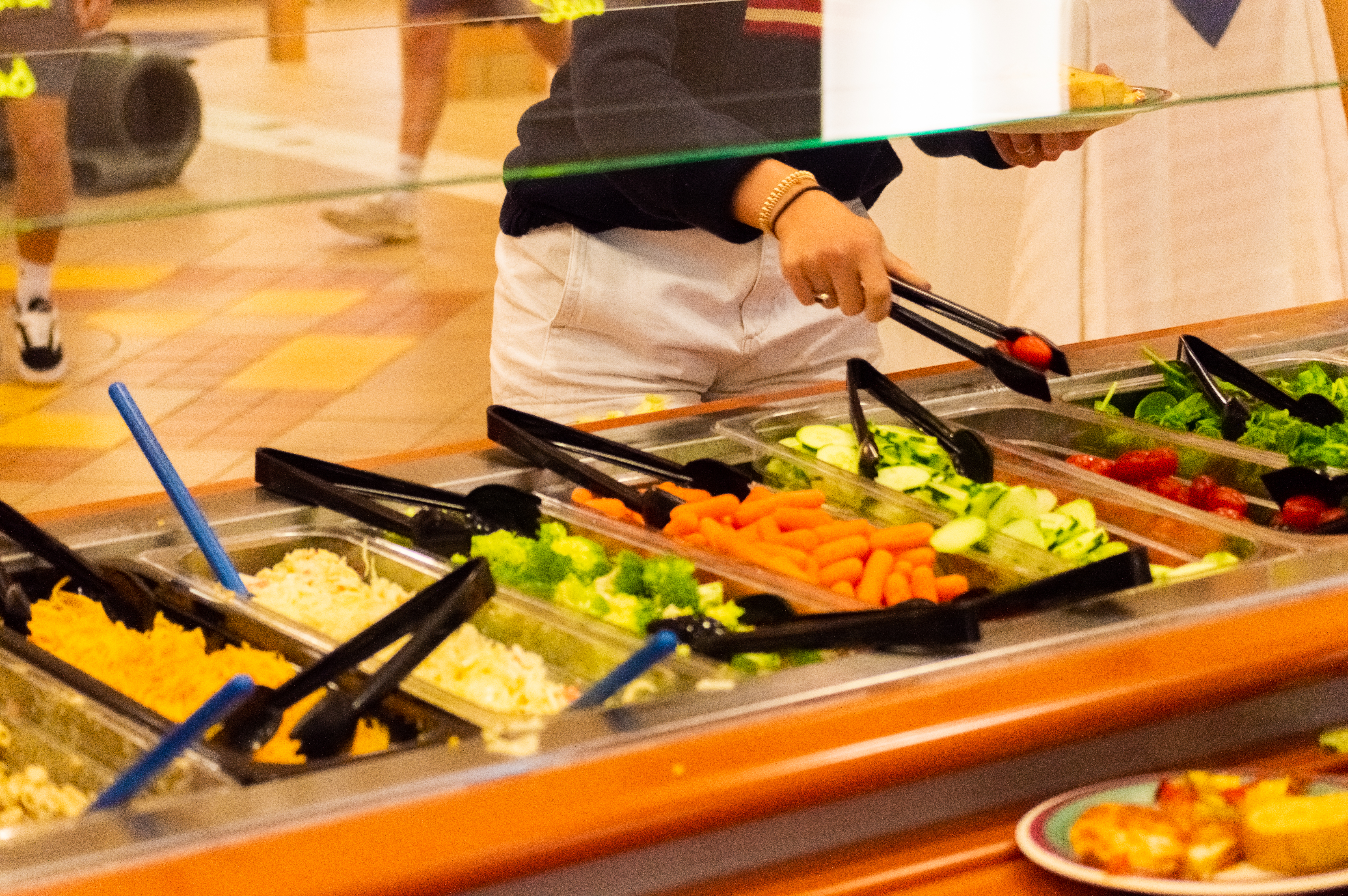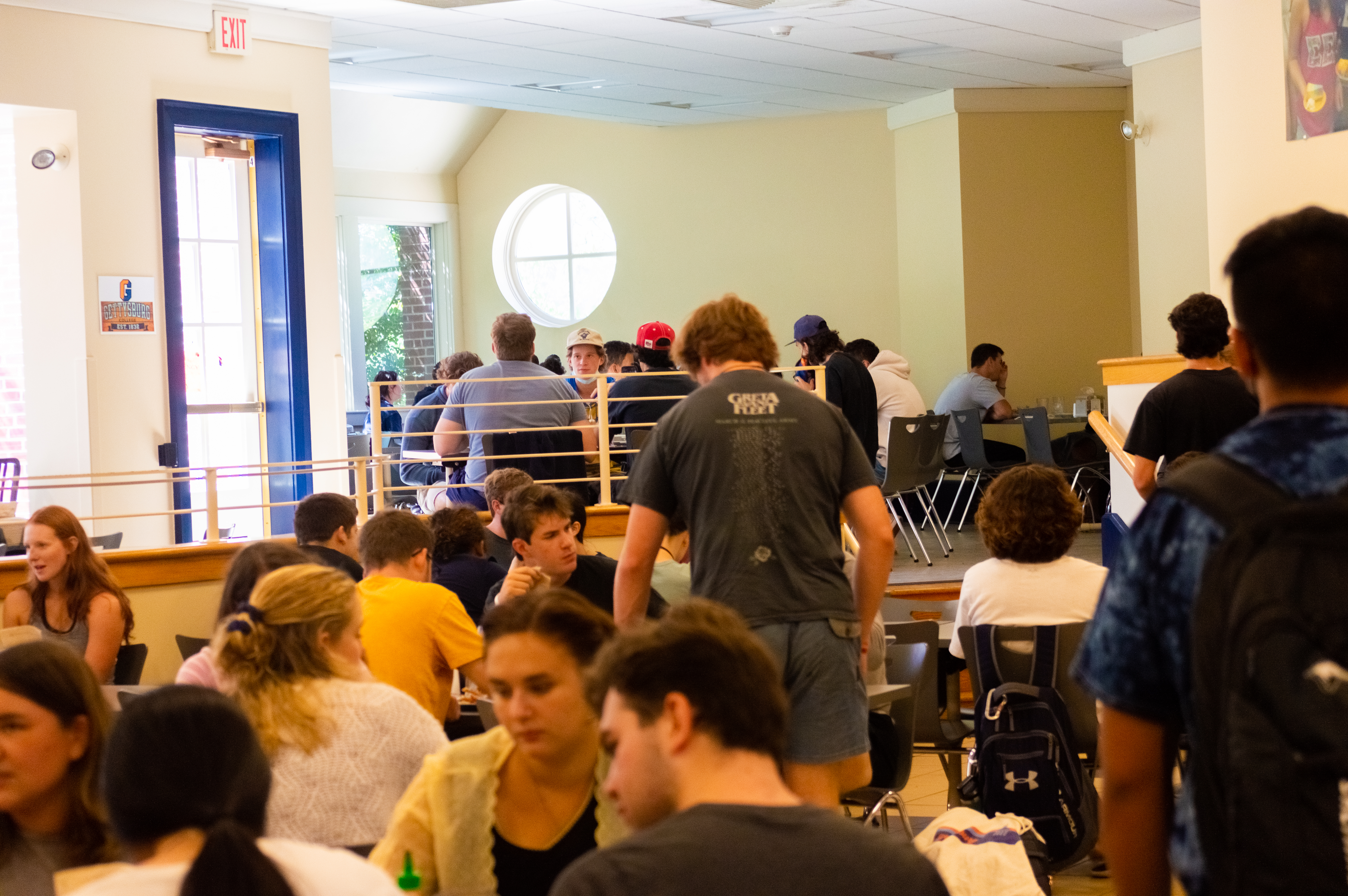By Phoebe Doscher, Editor-in-Chief
Gettysburg College’s Dining Services has faced delays and shortages with food supply in addition to being under-staffed as a result of the pandemic.
Executive Director of Auxiliary Services Mike Bishop explained the implications of these challenges and ways that the department has adjusted their operations with all students back on campus this semester.
Hiring Challenges Over-Burden Current Staff
Bishop identified staffing as the biggest challenge at the moment. They are currently working to fill 17 vacant, full-time positions, and have seen a 25 percent decrease in student applicants, a pool that typically has 80 positions.
“Student employees are generally great for us because they can work shorter periods of time,” Bishop said. “It’s very, very short-staffed … [We’re] trying to provide the service that we can, as best we can, without limiting services with the staff.”
Unlike restaurants, Gettysburg’s Dining Services must remain open each day of the week in order to provide students with regular meals. Without an adequate amount of staff members, some have to work overtime to fill the gaps.
Other supplementary solutions include reduced service options—such as fewer entrees, no deli option at Servo during dinner, and limited choices at the yogurt bar.
“We’ve tried to bring some of the [service options] down smaller. We haven’t reduced hours really at all, we’re strapped still trying to keep our hours open but that is probably the biggest struggle—trying to staff for longer periods of time,” Bishop said.
Not only are kitchen and service employees short-staffed, but they currently lack housekeepers, leaving Dining to outsource to companies or use their own cooks to help clean. Servo alone has over ten bathrooms that require maintenance, and the floors need to be mopped each night at close.
“Right now we’ve asked our cooks to sweep the floor, mop—things they are not normally used to doing that makes them stay around an extra half hour, an hour sometimes after we close. So it’s all a struggle, it’s just a rolling set of problems.”
Reasons for Being Short-Staffed and National Trends
The food service industry took a hit during the pandemic across the board. Some restaurants closed their doors for good, and employment numbers reached disparate levels. According to a study by Restaurant.org, 54 percent of casual and family dining operators report their staffing levels are more than 20 percent below normal.
The study also showed that in the range of 16-to-34-year-olds, 2 million fewer now work in the labor force. This age range comprises the highest percentage of workers in the food service industry.
Gettysburg’s Dining Services typically relies heavily on students in this age range, both from the college and high schoolers in the surrounding area, and those numbers are down too: “We’ve had no applicants from the high school,” Bishop said. “Those students don’t necessarily want to come and work, so it’s a struggle, but … we’re advertising for jobs all the time.”
Bishop said low employment numbers could be linked to “a variety of issues,” including caution with working in food service due to potential COVID risks or an aversion to wearing masks.
Not only has Dining struggled to hire new employees, but they also saw a decrease in staff after long-term employees chose to retire early, including Bishop’s former boss, whom he replaced.
“There’s been a lot of departures, and so there’s a brand new staff all over the place and … you lose that continuity and that consistency throughout your time,” Bishop said. “It takes me longer to do something than my previous boss because I just don’t know how to do it.”
Bishop said that some staff members in the athletic department have volunteered their time in Dining, “An hour or two from a coach or a trainer goes a long way to help us out … So it’s amazing to have that,” he said.
Delays and Shortages Limit Food Options
Bishop explained that food shortages and backups with deliveries limit Dining Services’ ability to provide varied options. “Normally, Servo runs a four-week cycle menu, so that things come up every four weeks and you get a different variety, and we’re still trying to follow that but that is a challenge,” he said.
Vendors have cut down the frequency of their deliveries from five days a week to two—due to anything from problems with manufacturing to truck drivers. This limitation has caused Bishop and Dining staff to rethink their normal operations.
“We actually rented an additional freezer to keep chicken in, so that if can we get the product, we have it on hand so that we can give it to our students,” Bishop said. “But again, it’s a problem of actually getting it to us.”
Gettysburg has identified a number of temporary solutions to compensate for these limitations, including outsourcing from local purveyors, including Weikert’s Egg Farm.
“We have a local butcher and a local guy who grows our beef for us,” Bishop said. “We’ve been working with him to say, ‘Hey, on short notice, can we get an extra thousand burgers,’ and usually he takes care of that for us.”
The entrees depend on whichever options are available. For example, the planned entree might be replaced for omelettes if Servo has eggs in stock. Options like bread and veggie burgers have also shrunk since the pandemic, leaving students with fewer varieties of gluten-free bread, for instance.
“They just don’t have the staff to make it,” Bishop said. “Sometimes [the veggie burgers] come, sometimes they don’t. So today, it might be this brand of veggie burger, tomorrow might be a different one, just because the suppliers don’t have them.”
Adapting This Semester: “Patience and Understanding”
Bishop and Dining Services Coordinator Lindsay Stevens advised students to follow Dining Services on Instagram to stay up to date on changes and seek answers to questions.
Above all, Bishop cautioned students to be patient with Dining Services as they navigate pandemic-dependent changes.
“Just be patient with everyone,” Bishop said. “We’re trying, we’re not doing anything intentionally. We’re not cutting the quality of our product to save money, it’s not about that. It’s just that we can’t get it.”
He added, “We’ll continue to work very hard to provide high quality food service as long as we can keep going throughout the semester.”
This article originally appeared on pages 12–13 of the September 24, 2021 edition of The Gettysburgian’s magazine.



